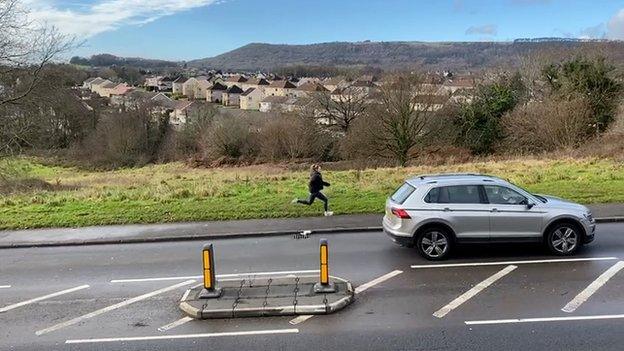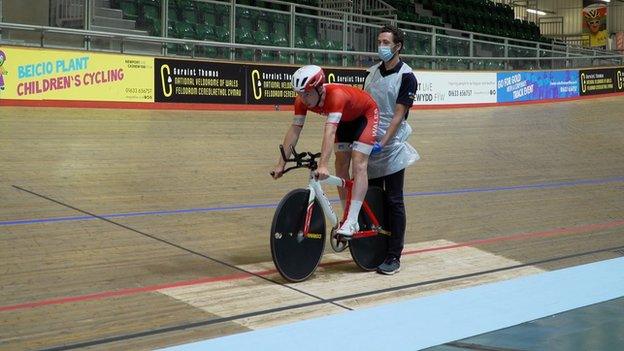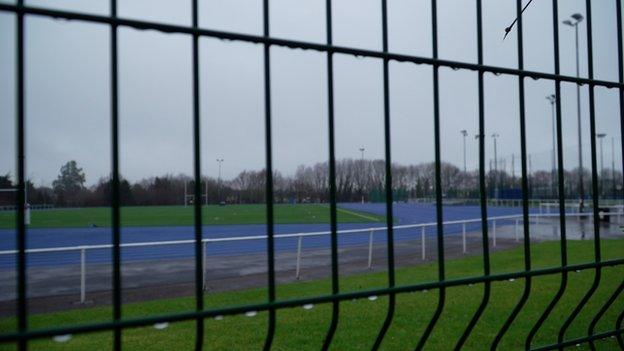Wales faces 'lost generation' of young athletes - sport leaders
- Published
Wales faces 'lost generation' of young athletes - sport leaders
Wales faces a 'lost generation' of young athletes unless more are allowed to train safely at official facilities, according to leading figures across four sports.
The chief executives of athletics, cycling, swimming and triathlon have written to First Minister Mark Drakeford, asking for more athletes to be given 'elite dispensation' to train during the current lockdown.
Sport Wales says it is unlikely any changes will be considered while Wales is still at alert level four.
The four chief executives fear Wales' performances at future major events like the Commonwealth Games could be affected while months of lost training could lead to some young athletes walking away from sport.
"We're really concerned," Welsh Athletics CEO James Williams told BBC Sport Wales.
"There's a very real risk of us losing a generation of very talented elite athletes due to the fact that they simply can't access the facilities they normally would be able to."
This week a number of female sprinters - who are not allowed to train at an athletics facility - revealed they had been verbally abused while training alone in parks or by roads.
"As we entered the tier four restrictions [in December], the number of athletes who had elite dispensation was reduced significantly," Williams continued.
"We understand why. The nation was in a much different place than we are currently.
"We now feel there's an opportunity to expand that list to get some of those athletes that are future Olympians and future Commonwealth Games athletes access to those specific facilities, coaching support and physiotherapy support to continue their development.

Welsh sprinter Hannah Brier says drivers have shouted 'derogatory abuse' at her as she has trained by the road.
Hannah Brier is one of the sprinters who highlighted the abuse she has received since her dispensation to access the track was removed.
The 23-year-old says not being allowed access to facilities is not only damaging her hopes of making a second Commonwealth Games - it is also forcing her to train in public places on her own.
"It's quite ironic that I'm off the track and told I can't use it for safety reasons yet I really don't see it's safe where I'm training at the moment," she said.
"I've had people drive back and forth shouting really derogatory comments at me about what I'm wearing and the fact that I'm a female. I really don't feel safe at all.
"But it's something I've got to get on with because I've got this goal of going to the Commonwealth Games. I truly believe that at this rate Wales won't have many athletes going [to Birmingham 2022]."
A call to government
Welsh Athletics boss Williams has written to the First Minister and Sport Wales in a joint letter with swimming's Fergus Feeney, triathlon's Beverley Lewis and cycling's Anne Adams-King.
All four leaders say they are grateful that their athletes aiming for this summer's Olympics and Paralympics are currently allowed to train.
But they claim there is enough extra space at their training venues to increase numbers while also maintaining their Covid-19 safety protocols.
"There's significant investment going in to keeping facilities open," cycling CEO Adams-King said. "But they're not being used at capacity.
"It's ok for the elite we've identified for 2022. But the riders underneath that, that are going to be going for the 2024 Olympics, they're losing their motivation. They're losing their ability to hone those skills.
"They can't do events at the moment so their training is vitally important."

Only a handful of designated elite athletes can use official training facilities in Wales during the current lockdown.
Triathlon boss Beverley Lewis fears there will be a long-term impact across all aspects of sport from the current restrictions.
"Our performance pathways are not only developing the top athlete," she said. "We're losing a generation of sporting leaders, sports science and top level coaches."
Laura Sharp is an 18-year-old triathlete from Mold. She is part of Welsh Triathlon's Development Academy and trained for 24 hours a week before the pandemic.
But she says the lack of access to swimming pools and gyms is 'holding her back' as she aims to make a career out of her sport.
"We're the future generation," she said. "If we're not getting the help we need, our age group won't have anywhere to go.
"If we haven't got support again soon, we might never get to the level we want to or wish to get to. There's a big question mark over when we'll be back."
Changes 'unlikely' in current lockdown
Responsibility for deciding which athletes are allowed to train lies with the National Sport Group - set up by Sport Wales in November. It includes representatives from Welsh Government.
Professional footballers and rugby players are allowed to train, along with those aiming for major events such as this summer's Tokyo Olympics and Paralympics.
Sport Wales says that significant increases to the number of athletes granted dispensation to train is unlikely to change while Wales is still at alert level four and the public health situation remains serious.

Many athletes were excluded from accessing training facilities when the latest lockdown began.
But swimming CEO Fergus Feeney believes it should be considered sooner in order to help Team Wales' prospects at next year's Commonwealth Games.
"15 months in sport is a long time," he said. "There's always that 16/17 year old pushing through.
"That's what makes Wales great. We've seen results in Gold Coast [2018 Commonwealth Games] and over the last few years and we want to keep that going. Let's try to deal with that before it's too late."
"We wouldn't want to impact our entire programme with something we thought would be detrimental. This is something we've thought through.
"We know there's space to operate safely for a larger cohort and we just want to have that conversation in a sensible way."